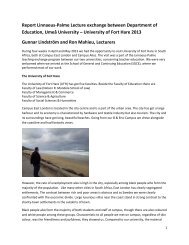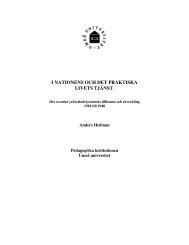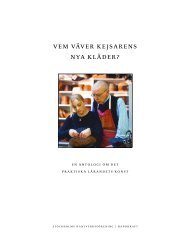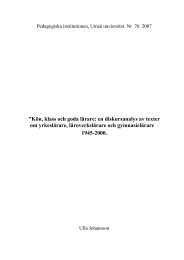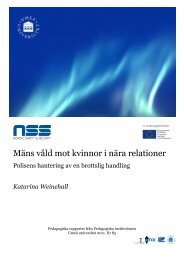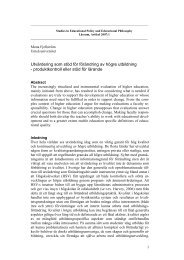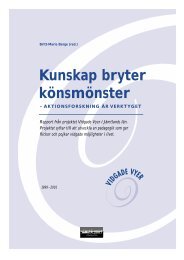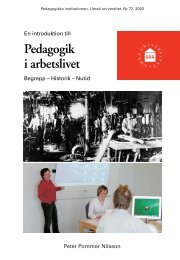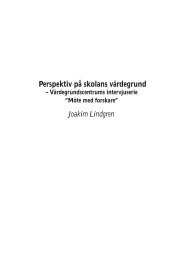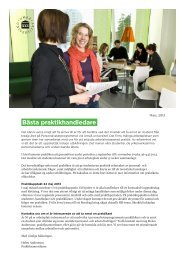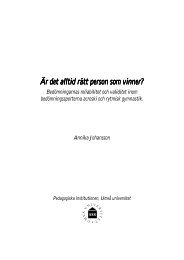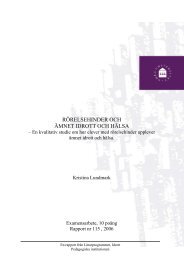IDENTITETSSKAPANDE I STUDENTFÖRENINGEN ULRIKA ... - DiVA
IDENTITETSSKAPANDE I STUDENTFÖRENINGEN ULRIKA ... - DiVA
IDENTITETSSKAPANDE I STUDENTFÖRENINGEN ULRIKA ... - DiVA
Create successful ePaper yourself
Turn your PDF publications into a flip-book with our unique Google optimized e-Paper software.
Widding, Ulrika. Identitetsskapande i studentföreningen: Köns- och klasskonstruktioner i<br />
massuniversitetet. (Identity Construction in the Students’ Society: Formations of Gender and<br />
Class in a Mass University). Academic dissertation, Faculty of Social Sciences, Umeå University,<br />
Sweden, 2006.<br />
(In Swedish, with an English summary.) ISBN: 91-7264-038-3 ; ISSN: 0281-6768<br />
Abstract<br />
This thesis deals with the construction of identity going on in Swedish students’<br />
societies, which is analyzed as an intersection of gender and social class.<br />
Theoretically, I draw on discourse analysis. Foucault’s genealogical method is<br />
applied in order to understand how discourses of the past are active today in<br />
students’ identity construction. The study is based on interviews with members<br />
of the board of three different societies. In all, 28 interviews were made.<br />
Furthermore texts and pictures from each society’s homepage were examined.<br />
Overall, the study shows that two main discourses are activated in students’<br />
identity construction. The members of the male-dominated society belonging<br />
to the Faculty of Natural Sciences and Technology represent a specific form of<br />
masculine identity in accordance with medieval ideas of student life. Being a<br />
student means to be without responsibility, to drink and have fun, and women<br />
are constructed as ‘the others’. The members see them-selves as rather ordinary<br />
men in the future. Women and men are active in equal numbers in the society<br />
of students belonging to the Faculty of Social Sciences. They activate the meritocratic<br />
discourse dating back to the 18th and 19th centuries as they construct<br />
themselves as future men in power with the right to speak. Women can however<br />
also represent this identity. In the society of students belonging to the Faculty<br />
of Medicine, women constitute the vast majority. They also activate the<br />
meritocratic discourse. However, they attach new meanings in accordance<br />
with the female symbolic gender to what should be regarded as merits: responsibility,<br />
respectability, care, and nicety. Thus, they represent a feminine identity,<br />
but the few male members do not adhere to these female symbolic norms.<br />
The society is an arena for the members’ resistance against hegemonic discourses<br />
of gender and class that would confine them to subordinate positions in<br />
their future working-life. Each society provides valuable symbolic capital that<br />
might be important.<br />
Key words: class, discourse, gender, genealogy, ideal identity, identity construction,<br />
ideological dilemma, intersectionality, mass university, students’ society,<br />
symbolic capital, the other.



